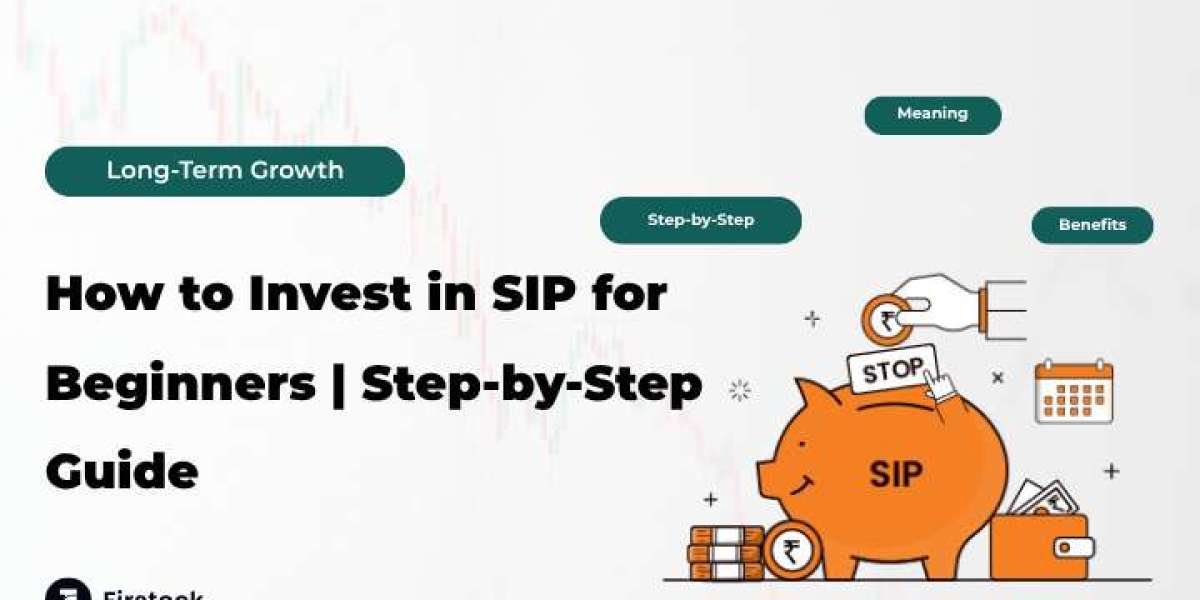Investment in SIP is Good or Bad? A Complete Beginner’s Guide
When it comes to investing, one question often crosses every beginner’s mind — “Is investment in SIP good or bad?” Whether you’re planning your first investment or looking to build long-term wealth, Systematic Investment Plans (SIPs) often come up as a simple, disciplined option.
But are SIPs really as good as people say? Or do they have hidden drawbacks? Let’s explore this step by step, in simple terms, and find out what makes SIPs a smart — or not-so-smart — choice for you.
Learn how to invest in SIP for beginners, understand SIP investment meaning, SIP investment full form, and how to invest in SIP without broker using a stock trading app.
What is SIP? Understanding the Meaning
Before we decide whether investment in SIP is good or bad, we first need to understand what SIP actually is.
SIP stands for Systematic Investment Plan, a method of investing a fixed amount regularly (say monthly or quarterly) in mutual funds. Instead of putting a large sum all at once, you invest smaller, consistent amounts — just like planting seeds in your financial garden every month.
Over time, these “seeds” grow into a strong financial tree through the power of compounding.
SIP Investment Full Form Explained
The SIP investment full form is Systematic Investment Plan — and the name says it all. It’s systematic (planned and disciplined), it’s investment (putting your money to work), and it’s a plan (a strategy for long-term growth).
Think of SIP as an auto-pilot mode for your investments — it helps you stay consistent, even when markets fluctuate.
How Does SIP Work? The Basics
In SIP, you invest a fixed amount at regular intervals into a mutual fund scheme of your choice. The fund manager uses your money to buy units based on the fund’s Net Asset Value (NAV).
- When markets are high, your fixed amount buys fewer units.
- When markets are low, you get more units.
This concept, known as rupee cost averaging, helps you average out your investment cost over time — reducing the impact of market volatility.
In short, SIP helps you invest smartly without timing the market.
Why SIP is Popular Among Beginners
For someone new to investing, SIP is like a friendly guide. Here’s why beginners love it:
- Low Entry Point: You can start with as little as ₹500 per month.
- Automatic Discipline: Investments happen automatically.
- Convenience: No need to monitor the market daily.
- Goal-Based: Perfect for goals like education, retirement, or buying a house.
It’s like having a “set it and forget it” system for your financial future.
Investment in SIP: Is it Good or Bad?
Now comes the main question — is investment in SIP good or bad?
In most cases, SIP is good for long-term investors. It helps build wealth gradually, encourages financial discipline, and minimizes emotional decisions.
However, it’s not a magic wand. SIPs can also result in short-term losses during market downturns. So, while SIPs are great for long-term goals, they’re not ideal for quick profits.
Advantages of SIP Investment
Let’s look at the key advantages that make SIPs a good investment choice:
a. Power of Compounding
Your small monthly investments grow exponentially over time as the returns start earning returns — that’s compounding in action.
b. Rupee Cost Averaging
You don’t have to worry about market highs or lows — SIP automatically averages out the cost of units purchased.
c. Financial Discipline
Since SIPs are automatic, they make saving and investing a habit.
d. Flexibility
You can increase, pause, or stop your SIP anytime — no rigid rules.
e. Goal-Oriented Investing
You can set up SIPs for specific financial goals like a dream vacation, retirement, or your child’s education.
Disadvantages of SIP Investment
Nothing is perfect — not even SIP. Here are a few downsides you should be aware of:
a. Market Risk
Since SIPs invest in mutual funds, returns depend on market performance. Short-term volatility can cause temporary losses.
b. No Guaranteed Returns
Unlike fixed deposits, SIPs don’t promise fixed returns.
c. Requires Patience
SIPs work best over the long term (5+ years). If you expect quick profits, SIP might disappoint.
d. Fund Choice Matters
Choosing the wrong mutual fund can affect your returns. Research is essential.
How to Invest in SIP for Beginners
If you’re wondering how to invest in SIP for beginners, here’s a simple step-by-step guide:
- Set Your Goal: Identify why you’re investing (e.g., retirement, education, wealth creation).
- Decide the Amount: Start small — even ₹500 a month can make a difference.
- Choose the Duration: Longer durations yield better results.
- Pick the Right Mutual Fund: Look for consistent performance and trusted fund houses.
- Complete KYC: Mandatory Know Your Customer (KYC) process is needed.
- Start the SIP: You can start online using a stock trading app or mutual fund website.
That’s it — your SIP journey begins automatically after setup.
How to Invest in SIP Without Broker
Want to save on commission? You can easily invest in SIP without a broker using these methods:
- Direct Mutual Fund Websites: Visit the fund house website (like HDFC, SBI, Axis, etc.) and invest directly.
- Stock Trading Apps: Platforms like Groww, Zerodha, or Paytm Money allow direct SIP investments.
- Registrar Platforms: Use platforms like CAMS or KFintech for direct SIP setup.
This way, you avoid paying distributor fees and get higher returns in the long run.
Using Stock Trading Apps for SIP Investments
A stock trading app simplifies SIP investing for beginners. You can browse mutual funds, compare returns, and automate your SIP in just a few clicks.
Popular apps like:
- Groww
- Zerodha Coin
- Upstox
- Paytm Money
- ET Money
These apps make it easy to track performance, pause SIPs, or switch funds anytime.
Think of it as having your own “pocket-sized financial advisor.”
SIP vs Lump Sum Investment: Which is Better?
This is a classic question. Let’s compare:
Factor | SIP | Lump Sum |
Investment Type | Regular small amounts | One-time big investment |
Market Timing | Not required | Crucial |
Risk | Lower (due to averaging) | Higher (if mistimed) |
Best For | Beginners, salaried individuals | Experienced investors |
Verdict: SIP is better for beginners who prefer consistency over risk.
How to Choose the Best SIP Plan
Before you start, analyze the following:
- Fund Performance: Check 3-5 year historical returns.
- Fund Type: Equity SIPs are riskier but high-return; debt SIPs are safer.
- Expense Ratio: Lower ratio = better returns.
- Reputation: Choose AMCs (Asset Management Companies) with good track records.
Use online tools and SIP calculators to make smart comparisons.
Common Mistakes to Avoid While Investing in SIP
Here are some common pitfalls:
- Stopping SIPs During Market Downturns: That’s when you buy more units cheap!
- Ignoring Goals: Always invest with a purpose.
- Choosing Random Funds: Research before you invest.
- Short-Term Exit: SIPs need time — at least 5–10 years for compounding to show results.
Tax Benefits and SIP
SIPs in ELSS (Equity Linked Savings Scheme) mutual funds qualify for tax deductions under Section 80C (up to ₹1.5 lakh per year).
However, not all SIPs are tax-saving. The returns are subject to Capital Gains Tax depending on your holding period and fund type (equity or debt).
Final Verdict: Should You Invest in SIP?
So, is investment in SIP good or bad?
Good — if you want long-term growth, financial discipline, and the power of compounding.
Bad — if you’re looking for short-term profits or can’t stay consistent.
For most people, SIP is a safe and smart way to start investing — especially for beginners who don’t have the time or expertise to trade actively.
Think of SIP as slow-cooked wealth — it takes time but delivers rich, lasting results.
FAQs
1. What is the SIP investment full form?
SIP stands for Systematic Investment Plan, where you invest a fixed amount regularly in mutual funds.
2. How to invest in SIP for beginners?
Beginners can start by selecting a goal, choosing a good mutual fund, completing KYC, and investing through a stock trading app or fund website.
3. Can I invest in SIP without a broker?
Yes! You can invest directly through AMC websites or apps like Groww and Zerodha Coin, avoiding broker commissions.
4. Is SIP better than lump sum investment?
For beginners, SIP is better as it averages costs and reduces risk compared to one-time lump sum investments.
5. Is SIP safe for long-term investment?
Yes, SIP is safe for long-term goals like retirement, education, or wealth creation — provided you stay invested and choose good funds.
In conclusion, investment in SIP is good for most people who want to grow their wealth gradually without worrying about market timing. With the right plan, patience, and consistency, SIPs can turn small savings into big achievements over time.



